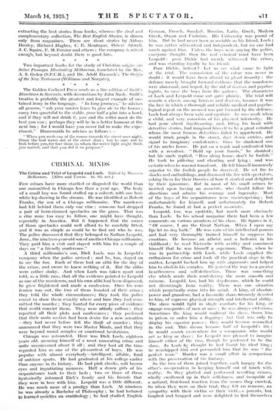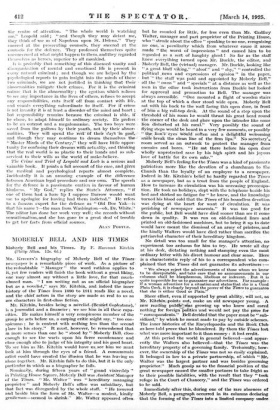CRIMINAL MINDS
The Crime and Trial of Leopold and Loeb. Edited by Maureen MeKernan. (Allen and Unwin. 8s. 6d. net.) FEW crimes have more startled or disgusted the world than one committed in Chicago less than a year ago. The body of a small boy was found stuffed up a culvert, with one bare white leg showing in the stream. He was identified as Robert Franks, the son of a Chicago millionaire. The murderers had left behind them only one clue : someone had dropped a pair of horn-rimmed spectacles on the grass. That was a clue none too easy to follow, one might have thought, especially in America. But it happened that the owner of those spectacles could well afford to be carefully fitted, and it was as simple as could be to find out who he was. The police discovered that they belonged to Nathan Leopold, Junr., the nineteen-year-old son of another Chicago millionaire, They paid him a visit and stayed with him for a couple of days on " a friendly•cOnference."
A third millionaire's son, Dick Loch, was in Leopold's company when the police arrived ; and he, too, stayed on to see the fun. Each of them had an alibi for the day of the crime, and swore he knew nothing of it. But the alibis were rather shaky. And when Loeb was taken apart and told, as a little ruse, that all the evidence pointed to Leopold as one of the murderers, and his own alibi had been disproved, he grew frightened and made a confession. Once his con- fession was out, the two of them boasted of their crime ; they told the whole circumstances; they took the police round to show them exactly where and hew they had com- mitted the murder ; they hunted for every-piece of evidence that could convict them. They were uttesrly callous : they reported all their plots and conferences ; they professed that their main motive had been desire for a new sensation they had never before felt the thrill of murder ; they announced that they were two Master Minds, and that they were beyond moral scruples or emotional hesitations.
Chicago was astounded. Here was Dick Loeb, eighteen years old, accusing himself of a most nauseating crime and quite unconcerned about it all ; and they had all the time regarded him as one of the pleasantest of boys. He was popular with almost everybody—intelligent, affable, fond of outdoor sports: He had graduated at his college earlier than anyone in its history. He had pink cheeks, soft brown eyes and ingratiating manners. Half a dozen girls of his acquaintance took to their beds ; two or three of them hysterically informed Dick's family and his friends that they were in love with him. Leopold was a little different.• He was much more of a prodigy than Loeb. -At nineteen he was already a Bachelor of Philosophy ; he had lectured It learned societies on ornithology ; he had studied English.
German, French, Sanskrit, Russian, Latin, Greek, Modern Greek, Oscan and Umbrian. His- University was proud of him. But he had never been as sociable as his friend, Loeb ; lie was rather .self-eentred and independent, but no one had much against him. Unless the boys were guying the police, everyone thought, then the real criminal must have been Leopold ; poor Dickie had merely witnessed the crime, and was standing loyally by his friend.
Poor Diekic, indeed ? Let us see what came to light at the trial. The commission of the crime wu.s never in doubt.: it would have been absurd to plead insanity : the defence merely brought forward evidence that the murderers were abnormals and hoped, by the aid of doctors and psycho- logists, to save the boys from the gallows. The characters of Loeb and Leopold conic out quite plainly. The trial wilt remain a classic among lawyers and doctors, because it was the first in which a thorough and reliable medical and psycho- logical report on the accused was put forward by the defence. Loeb had always been vain and egotistic--he was weak when a child, and very conscious of his physical inferiority. He had gone about daydreaming, and, filling his head with detective stories, had imagined himself to be a great criminal whom the most -famous detectives failed to apprehend. He world track people in the street, dart down entries, and signal to imaginary confederates. Once he shadowed one of his uncles home. He put air a mask and confronted him with a revolver. " Hold up your hands," lie shouted ; but his uncle replied, " Run along home, (iota be foolish." He took to pilfering and cheating and lying ; and was ecstatic when he was not found out. He felt himself immensely superior to the foolish people he deceived. He set fire to shacks and outbuildings, and discussed the fire with spectators, asking them for their theories of how it started and delighted by their ignorance. But in most of his small crimes he insisted upon having an associate, who should follow his directions and admire his courage and ingenuity. Most of the boys of his acquaintance were unenterprising ; but unfortunately for himself, and unfortunately for Robert Franks, lie found at last a perfect associate.
Leopold, too, was egotistic, but much more obviously than Loeb. In his school magazine there had been a few comments on various members of his class. He figures in it " Of course, I am the Great Nathan. When I open my lips let no dog bark." He was vain of his intellectual powers and had very thoroughly trained himself to suppress his emotions. Ile became an atheist and a hedonist in his childhood ; he read Nietzsche with avidity and convinced himself that he was himself a superman. Thus, when he was in partnership with Loeb, while Loeb supplied the enthusiasm for crime and took all the practical steps in the matter, Leopold backed him up with arguments and helped him to abolish his scruples. He pointed the way to a greater heartlessness and self-deification. There was something else which made their confederacy the more smooth and ruinous. Leopold, too, had his daydreams, which he could not disentangle from reality. There was one situation which perpetually came into his mind. A king, of absolute power and. grandeur, had a. favourite slaveeintensely devoted to him, of supreme physical•strength and intellectual ability. The starve wttrfld tight in single combats for his king, or engage companies of men at. once ; he was always victorious. Sometimes the king would maltreat the slave, throw him in prison or order hint a flogging ; but that was only to display his superior power ; they would become reconciled in the end. This dream became half of Leopold's life ; he would search everywhere lhr a companion who would act as king or slave ; for Leopold was pleased to imagine himself either of the two, though he preferred to be the slave. In Loeb he thought he bad found his ideal king ; he worshipped liirrt and persuaded hint that he was " the perfect man." Murder was 'a small affair in comparison with the preservation of his fantasy.
So the two of them joined together, each hungry for the other's co-operation in keeping himself out of touch with reality. So they plotted and performed revolting crimes, wholly swallowed up in their selfishness, and incapable of a natural, first-hand reaction front the scenes they enacted. So when they were on their trial, they felt no remorse, no sympathy with- their victim or their vial:. s parents, but laughed and bragged and were delighted to ljnd themselves
the centre of attention. " The whole world is watching me," Leopold said ; " and though they may detest me, they think of me as of Napoleon upon St. Helena." They sneered at the prosecuting counsels, they sneered at the counsels for the defence. They professed themselves quite unconcerned at what might happen to them, and they regarded themselves as heroes, superior to all mankind.
It is probably that something of this diseased vanity and - disorganization of mental and emotional life is present - in every natural criminal ; and though we are helped by the '• psychological reports to gain insight into the minds of these two criminals, we are not justified in thinking that their abnormalities mitigate their crimes. For it is. the criminal aiature that is the abnormality ; the egotism which refuses to sec any importance in the lives of others, refugeS to accept any responsibilities, cuts itself off from contact with life, and counts everything subordinate to itself. Foi if crime is not insanity it is at least a disorder of the mind and heart ; but responsibility remains because the criminal is able, if he chose, to adapt himself to ordinary society. Ile prefers to be an outcast and a megalomaniac. The two boys were saved from the gallows by their youth, not by their abnor- malities. They Will spend 'the risr '61. their 'day% In- Voir; and though they may continue to dream themselves the.= " Mister Minds of the Century," they will have little oppor- tunity for confusing their dreams with actuality, and thinking that the real world is as plastic to their hands and as sub- servient to their wills as the world of make-belieVe.
The Crime and Trial of Leopold find Loeb is a serious and valuable book. It prints a full account of the ease, and gives the medical and psychological reports almost complete. Incidentally it is an amazing example of the difference between American legal procedure and our min. The speech for the defence is a passionate oration in favour of human kindness. " My God," replies the State's Attorney, " if one of them had a hare lip I suppose Darrow would want me to apologize for having had them indicted." He refers to a famous expert for the defence as " Old Doc Yak—is that his name ?—the man from Washington—oh, Dr. White:' The editor has done her work very well ; she records without sensationalism, and she has gone to a great deal of trouble to get her facts from official sources.
ALAN PORTER.















































 Previous page
Previous page